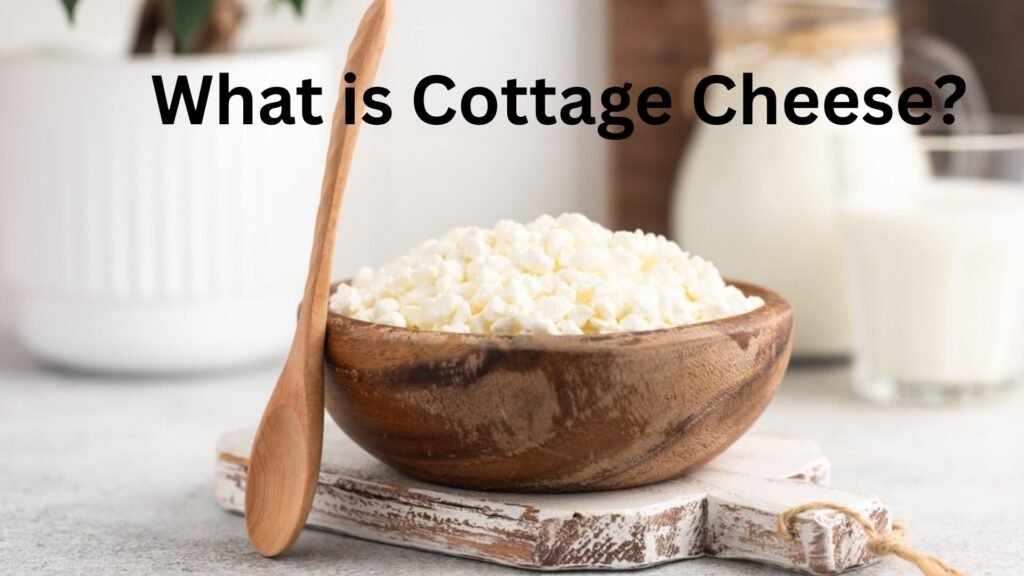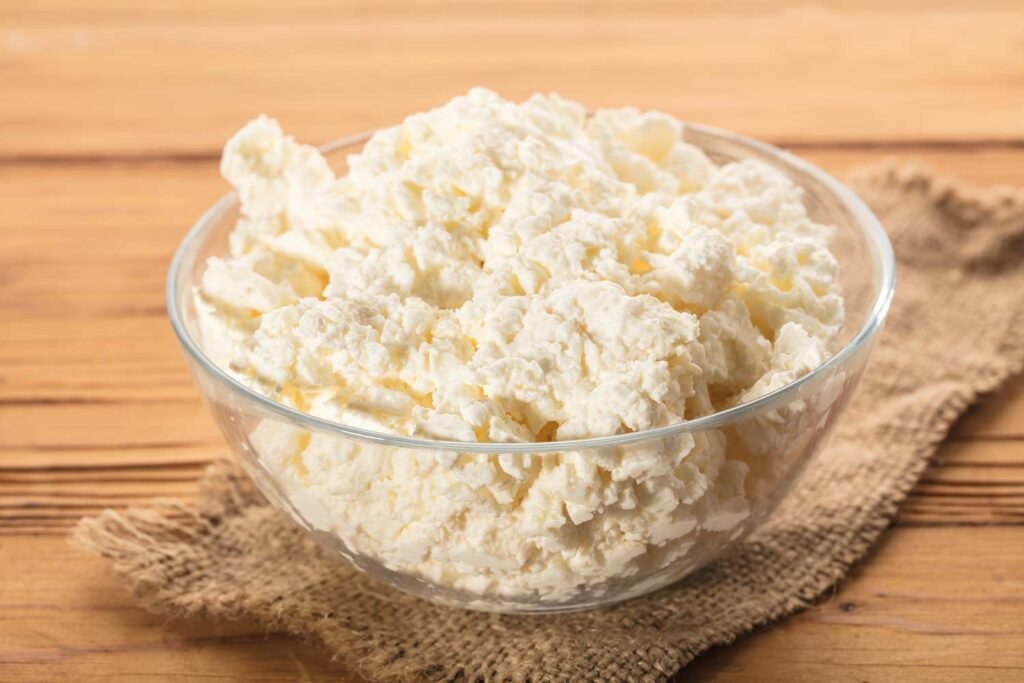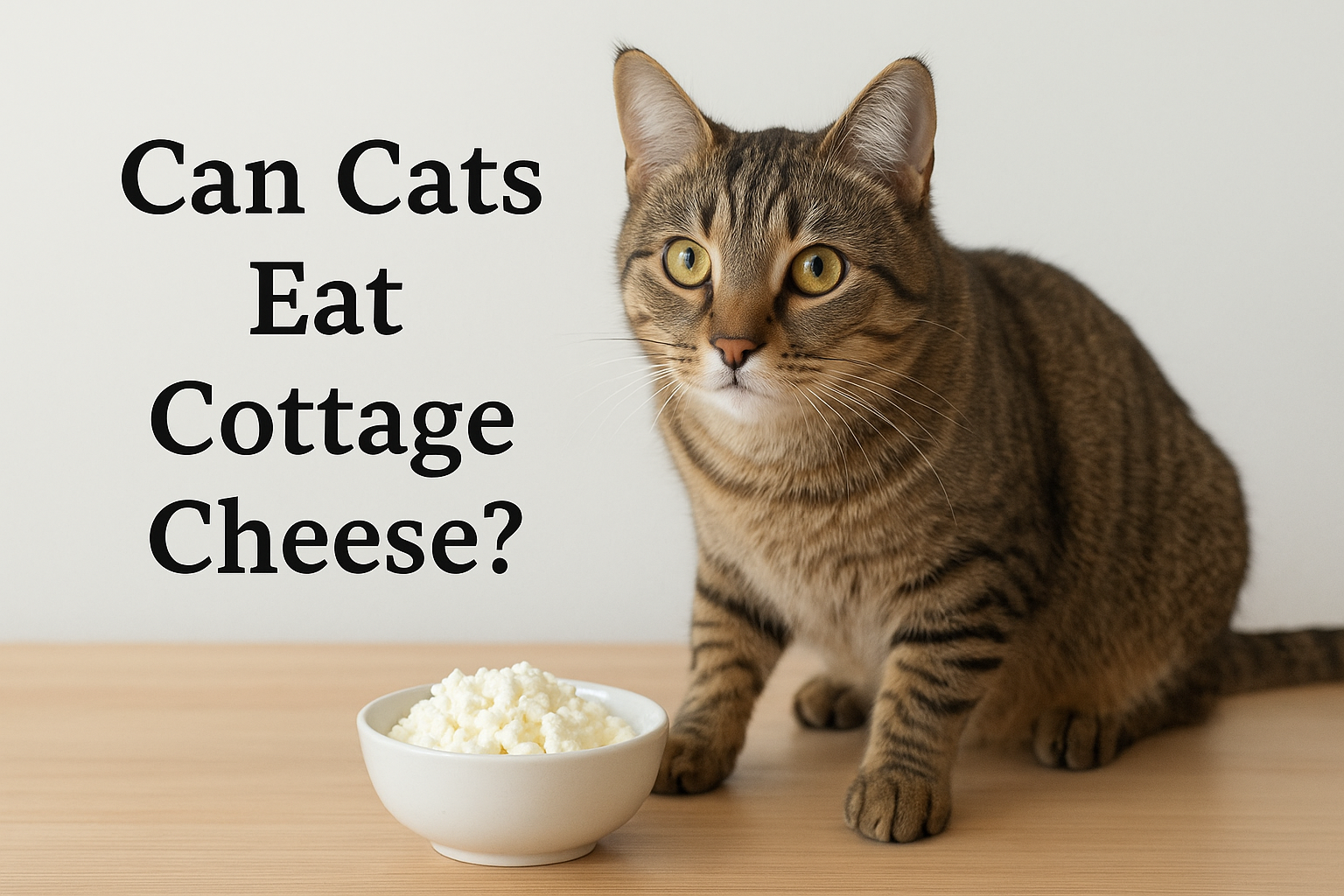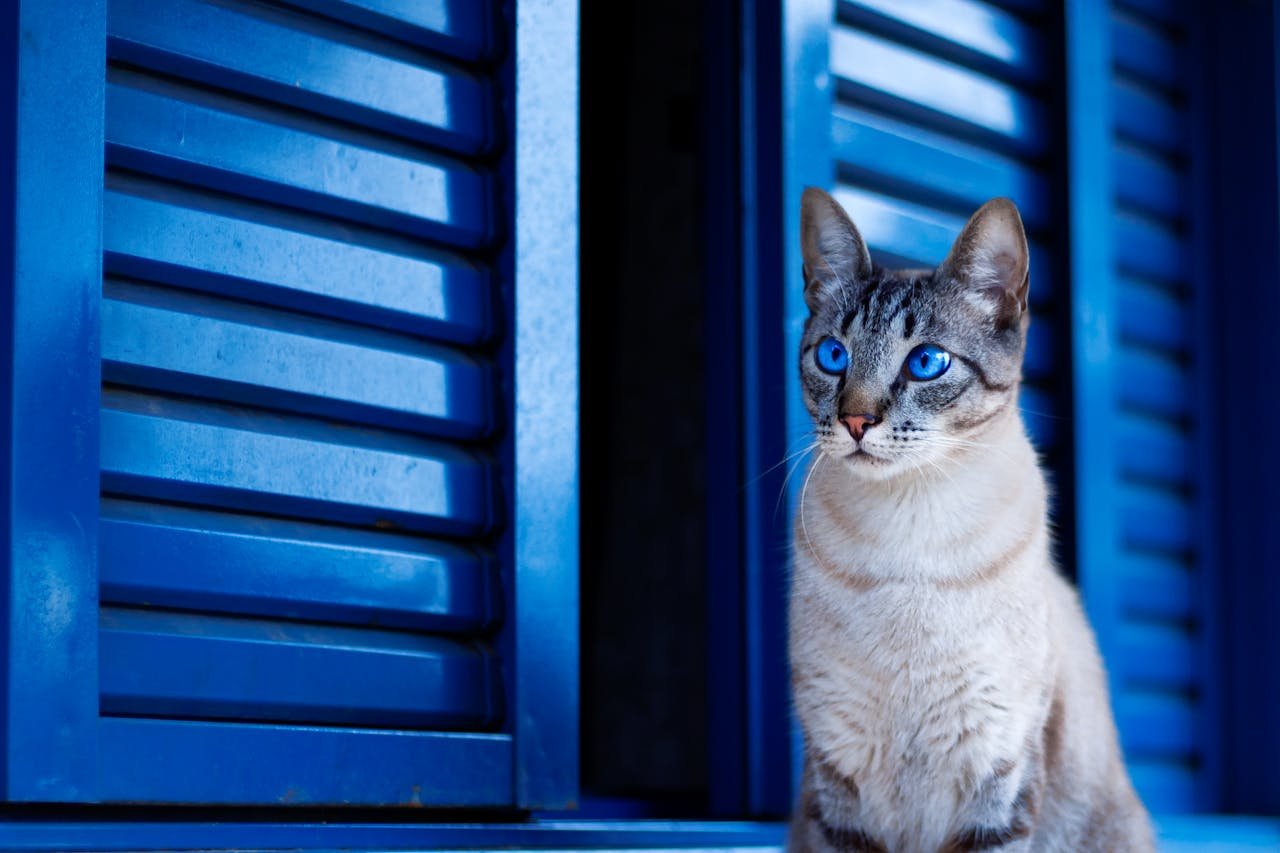Can Cats Have Cottage Cheese as a Treat? Safe Feeding Explained
Cats are curious creatures with a natural love for creamy and savory foods, and cottage cheese is no exception. Many pet owners wonder, “Can cats eat cottage cheese as a treat?” The answer is yes—but only in moderation. Cottage cheese contains protein and some beneficial minerals, but since most cats are lactose intolerant, their digestive systems may struggle with dairy if given in large amounts.
A small spoonful of cottage cheese once in a while can be safe, but it should never replace your cat’s regular, balanced diet. Always monitor your feline after offering this treat to watch for signs of stomach upset, and consult your vet before making it a routine snack. By keeping cottage cheese as an occasional indulgence, you can satisfy your cat’s curiosity while protecting their long-term health.
What is Cottage Cheese?

Unlike aged cheeses, it is soft, creamy, and has a mild, slightly tangy flavor. Its light texture and nutritional profile make it a popular ves, or artificial flavors are added, cottage cheese quickly becomes unsafe for cats.choice among health-conscious people. Cottage cheese is naturally rich in protein, calcium, and essential vitamins, while being relatively low in fat, which is why it’s often included in weight management and muscle-building diets.
Key Features of Cottage Cheese
- Made from curds of cow’s milk
- Fresh cheese, not aged like cheddar or Parmesan
- Mild, creamy, and slightly tangy taste
- A source of protein, calcium, and vitamins
- Commonly used in healthy diets and fitness meals
Can Cats Eat Cottage Cheese?
Yes, cats can eat cottage cheese, but only as an occasional treat. It is not toxic to felines and may provide a small boost of protein. However, cottage cheese should never become a regular part of your cat’s diet because of the risks it carries.
Why Cottage Cheese Isn’t Ideal for Cats
- High in lactose: Most cats are lactose intolerant, which means they struggle to digest dairy. Eating too much cottage cheese can lead to vomiting, diarrhea, bloating, or stomach pain.
- High in sodium: Cottage cheese contains salt, and excessive sodium can cause dehydration, electrolyte imbalance, and long-term health issues in cats.
- Digestive upset: Just like cream cheese, cottage cheese is best avoided in large amounts, as even a small serving can upset sensitive stomachs.
Safe Approach
If you want to share cottage cheese with your cat, keep the portion very small and occasional. Always watch for signs of discomfort and avoid offering it if your cat has shown sensitivity to dairy before.
Related Post: Can Cats Eat Blackberries? Safety, Health Perks & Feeding Tips 2025
Is Cottage Cheese Safe for Cats to Eat?
Cats can safely enjoy plain cottage cheese in minimal amounts, as it is one of the lowest-lactose and lower-calorie cheese options. However, this safety only applies to unflavored and unsalted varieties. Once seasonings, additi
Unsafe Types of Cottage Cheese for Cats
- Flavored or seasoned versions often contain spices, salt, or additives harmful to cats.
- Chili or pepper blends – too spicy and irritating for a cat’s stomach.
- Onion and chive cottage cheese is toxic to cats and can damage red blood cells.
- Processed cottage cheese is high in preservatives and sodium, which can cause dehydration and digestive upset.
Key Takeaway
If you want to share cottage cheese with your feline, make sure it’s plain, unsalted, and unseasoned—and only as an occasional treat. Store-bought flavored varieties may be appealing to us, but they can pose serious risks to your cat’s health.
Risks of Feeding Cottage Cheese to Cats
Although cottage cheese is not toxic, it poses several health concerns when fed to cats too frequently. Felines have sensitive digestive systems and don’t process dairy like humans, which means even small amounts can lead to issues. Here are the main risks of feeding cottage cheese to cats:
- Lactose intolerance – Most cats lack the enzyme needed to digest lactose, leading to diarrhea, bloating, and stomach discomfort.
- Excess sodium – Cottage cheese is naturally high in salt, which can cause dehydration and put stress on a cat’s kidneys.
- Digestive upset – Soft cheeses may trigger vomiting or loose stools in sensitive cats.
- Toxic flavorings – Varieties with onion, garlic, chives, or spices are harmful and can even be toxic.
- Unwanted weight gain – Extra calories from cheese contribute to obesity, especially in indoor cats with low activity levels.
Can Kittens Eat Cottage Cheese?
At first glance, it may seem like kittens can safely eat cheese since they drink their mother’s milk. However, this is not the case. Kittens produce lactase enzymes only while nursing, which helps them digest their mother’s milk. Once they begin weaning and switch to solid food, their ability to break down lactose decreases significantly. This means feeding dairy products, including cottage cheese, can cause digestive problems.

Why Cottage Cheese Is Unsafe for Kittens
- Reduced lactose tolerance – After weaning, kittens lose the enzymes needed to digest dairy.
- Digestive distress – Cottage cheese can trigger loose stools, bloating, and discomfort.
- Nutritional imbalance – Kittens need precise nutrients for growth, which dairy cannot provide.
- Weakened immunity – Ongoing digestive upset may harm their developing intestines and immune system.
In short, kittens should avoid cottage cheese entirely. Instead, focus on a balanced kitten diet that provides the nutrients they need for healthy growth and development.
The Safer Alternatives to Cottage Cheese for Cats
Cottage cheese is a creamy dairy product made mainly from milk and cream. While it may look harmless, it often contains small amounts of salt, sugar, sodium benzoate, soybean oil, or added flavorings — none of which are ideal for feline health.
That said, plain cottage cheese isn’t highly toxic either and does provide a few nutrients. Let’s look at the potential benefits and limitations.
Nutritional Highlights of Cottage Cheese for Cats
- High in protein – supports muscle health and energy.
- Contains calcium and iron – essential for bone strength and oxygen transport.
- Rich in B vitamins (B2, B6, B12) – help with metabolism and nervous system functions.
- Provides amino acids – necessary for overall growth and repair.
Why Cottage Cheese Isn’t Ideal for Cats
Despite these nutrients, cottage cheese is not the best food for cats because:
- Most cats are lactose intolerant, leading to stomach upset.
- It is intended for humans, not formulated to meet feline dietary needs.
- Cats are obligate carnivores — their nutrition should come primarily from animal-based protein, not dairy.
- Additives like salt or preservatives may cause long-term health issues.
The Healthier Choice
Instead of cottage cheese, provide your cat with:
- High-quality, meat-based cat food.
- Occasional treats designed specifically for feline nutrition.
- Fresh water as the main hydration source (not dairy products).
Feeding Guidelines and Preparation
If you decide to let your cat try cottage cheese, it should only be in tiny, occasional portions. Adult cats can have no more than half a teaspoon once or twice a week, and even then, it should only be plain, unseasoned cottage cheese. Some vets may allow its use to hide bitter medications, but always consult your veterinarian before trying this method.
When preparing cottage cheese for your cat, follow these simple rules:
- Serve only plain and unsalted cottage cheese.
- Keep portions very small to avoid stomach upset.
- Offer it as a treat, not a meal replacement.
- Always check with your vet before using cottage cheese to give medicine.
Avoid feeding cottage cheese that contains any of the following unsafe ingredients, as they can be toxic or harmful to cats:
- Garlic
- Onions
- Chives
- Chili spices
- Sodium benzoate
- Artificial colors
- Artificial flavors
Related Post: Can Cats Eat Sourdough Bread? Danger or Delight?
Before sharing any human food with your cat, always read the ingredient label carefully. What is safe for us may cause serious health problems in cats, even in very small amounts.
Final Thoughts
Cottage cheese can have for cats can be given as an occasional treat, but it should always be offered in moderation. While plain cottage cheese provides protein and a few nutrients, it isn’t a natural part of a feline’s diet and may cause digestive upset in lactose-intolerant cats. To keep your cat healthy and safe, follow these key points:
- Only offer plain, unsalted cottage cheese in tiny portions.
- Avoid flavored or seasoned varieties with onion, garlic, or spices.
- Always consult your vet before adding new foods to your cat’s diet.
By keeping these simple guidelines in mind, you can make sure cottage cheese remains a safe, occasional indulgence without risking your cat’s long-term health.
FAQs About Cottage Cheese for Cats
Can cats eat cottage cheese every day?
No, cats should not eat cottage cheese daily. Even though it is not toxic, most cats are lactose intolerant, and frequent feeding can lead to stomach upset and diarrhea.
Is cottage cheese good for cats with digestive issues?
Plain cottage cheese may provide protein, but it’s not recommended for cats with sensitive stomachs. Its lactose content can worsen digestive problems instead of helping.
Can kittens have cottage cheese?
Kittens should avoid cottage cheese. As they grow, their ability to digest lactose decreases, and feeding cottage cheese may cause intestinal issues and interfere with their nutritional needs.
What type of cottage cheese is safe for cats?
Only plain, unsalted cottage cheese in very small portions is safe. Avoid flavored, seasoned, or store-bought varieties with garlic, onion, or artificial additives, as these can be toxic to cats.
5. How much cottage cheese can I give my cat?
Most adult cats should have no more than half a teaspoon of plain cottage cheese once or twice a week, and only if your vet agrees.
What are the risks of feeding cottage cheese to cats?
The main risks include:
- Digestive upset (vomiting, diarrhea, gas).
- High sodium intake leads to dehydration.
- Exposure to toxic additives in flavored versions.
For More Visits: SiameseMania
Also Read: Can Cats Eat Asparagus? Benefits, Risks & Safe Feeding Guide (2025)

